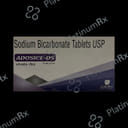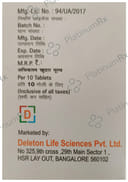Sodium Bicarbonate
Uses
Sodium Bicarbonate Uses Sodium Bicarbonate is used to relieve indigestion. It serves as an alkalinizing agent in the treatment of metabolic acidosis, severe diarrhea, acidity, and poisoning.
How it Works
How Sodium Bicarbonate works Sodium Bicarbonate is an alkalizing agent. It functions by increasing the pH of blood and urine, thereby correcting metabolic acidosis, which is characterized by high acid levels in the body. Additionally, it accelerates the elimination of toxic substances from the body in cases of certain types of poisoning. In situations involving excessive fluid loss, such as diarrhea, it helps replenish salt and electrolyte levels.
Side Effects
Common side effects of sodium bicarbonate include flatulence, abdominal pain, increased sodium levels in the blood, injection site reactions (pain, swelling, redness), lactic acidosis, metabolic alkalosis, peripheral edema, seizures, tetany, and tremors.
Related Medications
Sodium Bicarbonate 1000mg

₹67
₹44.5
MRP ₹89
Sodium Bicarbonate 1000mg

₹62
₹44.5
MRP ₹89
Sodium Bicarbonate 1000mg

₹86
₹44.5
MRP ₹89
Sodium Bicarbonate 500mg

₹41
₹26.6
MRP ₹59
Sodium Bicarbonate 500mg

₹43
₹26.6
MRP ₹59
Sodium Bicarbonate 500mg

₹49
₹26.6
MRP ₹59
Sodium Bicarbonate 300mg

₹60

₹28.1
MRP ₹56.3
Sodium Bicarbonate 1000mg

₹75
₹44.5
MRP ₹89
Sodium Bicarbonate 500mg

₹65
₹26.6
MRP ₹59
Sodium Bicarbonate 500mg

₹45
₹26.6
MRP ₹59
Sodium Bicarbonate 1000mg

₹39.6
₹44.5
MRP ₹89
Sodium Bicarbonate 1000mg

₹145
₹44.5
MRP ₹89
Sodium Bicarbonate 500mg

₹51.9
₹26.6
MRP ₹59
Sodium Bicarbonate 1000mg
₹93.8
₹44.5
MRP ₹89
Sodium Bicarbonate 500mg
₹33.8
₹26.6
MRP ₹59
Sodium Bicarbonate

₹757
Sodium Bicarbonate

₹400
Sodium Bicarbonate

₹115
Sodium Bicarbonate

₹72
Sodium Bicarbonate

₹143.4
Sodium Bicarbonate

₹228
Sodium Bicarbonate

₹149
Sodium Bicarbonate

₹110
Sodium Bicarbonate

₹272
Sodium Bicarbonate

₹280
Flat ₹100 off on first app order | Use Code: APP100 |
Flat ₹100 off on first app order
USE CODE: APP100

Download Now